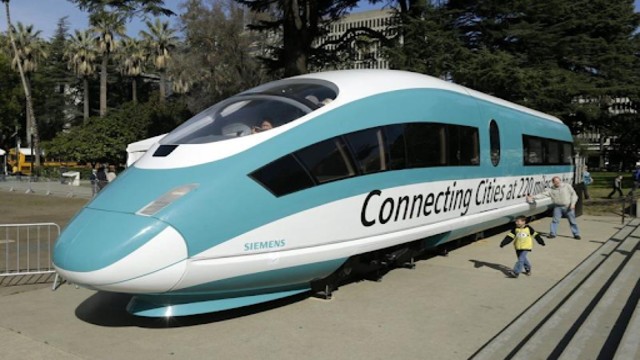
A full-scale mock-up of a high-speed train, is displayed at the Capitol in Sacramento, Calif, on Feb. 26, 2025. (AP Photo)
The California high-speed rail project is under renewed federal scrutiny, with transportation officials announcing an investigation that could lead to the withdrawal of nearly $4 billion in federal funding. The move raises fresh concerns over the future of the long-delayed project.
A Project Plagued by Delays
Initially approved by voters in 2008, the high-speed rail was envisioned to connect San Francisco and Los Angeles in under three hours. The project was expected to cost $33 billion and be completed by 2020. However, cost overruns and funding challenges have pushed the estimated price to $106 billion, with completion now projected within the next two decades—if funding is secured.
Currently, efforts are concentrated on a 171-mile segment between Bakersfield and Merced, which is expected to be operational by 2033.
Federal Funds at Risk
U.S. Transportation Secretary Sean Duffy stated that his office is reviewing whether the California High-Speed Rail Authority has upheld its commitments tied to federal funding. If violations are found, the funds may be reallocated to other infrastructure projects across the country.
This is not the first time federal funding has been threatened. In 2019, nearly $1 billion in funds was canceled under the Trump administration but later restored under President Biden. In December 2023, an additional $3.3 billion was allocated to the project. Losing federal support now could severely impact future progress, as the rail authority’s business plan relies on securing up to $8 billion from federal sources.
Defending the Project
California High-Speed Rail Authority CEO Ian Choudri welcomed the investigation, emphasizing transparency and progress. He noted that previous audits have accounted for every dollar spent and that the project has already created nearly 15,000 jobs. More than 50 major structures have been completed.
Political Backlash
Critics of the project, particularly Republican lawmakers, continue to highlight its soaring costs. Rep. Kevin Kiley, who has long opposed the rail initiative, called it “the worst public infrastructure failure in U.S. history.” He has introduced legislation to block further federal funding for the project.
During a press conference announcing the investigation, Kiley and Duffy were met with protests. Demonstrators chanted in support of the rail project, holding signs urging its continuation.
Supporters Call for Bold Action
Despite the criticism, many transit advocates remain hopeful. Eli Lipmen, executive director of Move LA, dismissed the federal probe as politically motivated.
Meanwhile, leaders from the Transportation Trades Department coalition, representing national rail unions, urged the U.S. to invest in modern transportation. They highlighted the need for leadership to bring high-speed rail to the country, emphasizing that other nations have already embraced this technology.
With federal funding at stake, the fate of California’s high-speed rail remains uncertain. The outcome of the investigation could determine whether the ambitious project moves forward or faces further setbacks.















